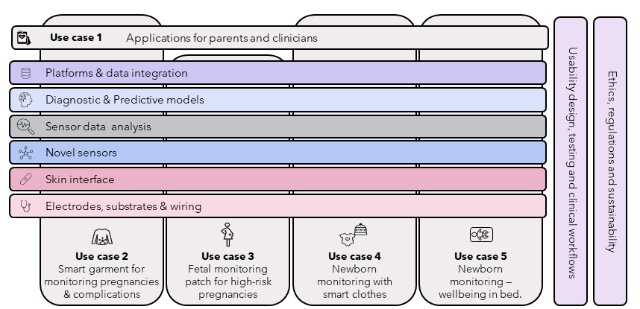
The beginning of a pregnancy is accompanied by a period of intensive health monitoring of the baby and the pregnant person. Conventional prenatal examinations with ultrasound devices, however, only capture snapshots of the respective condition and require frequent visits to doctors, especially in high-risk pregnancies. With the help of novel wearables and smart textiles, researchers in the EU-funded project Newlife aim to enable continuous obstetric monitoring in everyday life.
One goal of the consortium, consisting of 25 partners, is the development of a biocompatible, stretchable, and flexible patch to monitor the progress of the pregnancy and the embryo. Similar to a band-aid, the patch will be applied to the pregnant person’s skin, continuously recording vital data using miniaturized sensors (e.g., ultrasound) and transmitting it via Bluetooth.
For some time now, modern medical technology has been relying on smart textiles and intelligent wearables to offer patients convenient, continuous monitoring at home instead of stationary surveillance. At the Fraunhofer Institute for Reliability and Microelectronics IZM, a team led by Christine Kallmayer is bringing this technology to application-oriented implementation, benefitting from the Fraunhofer IZM’s years of experience with integrating technologies into flexible materials. For the integrated patch, the researchers are using thermoplastic polyurethane as base materials, in which electronics and sensors are embedded. This ensures that the wearing experience is similar to that of a regular band-aid instead of a rigid film.
To ensure that the obstetric monitoring is imperceptible and comfortable for both pregnant individuals and the unborn child, the project consortium plans to integrate innovative MEMS-based ultrasound sensors directly into the PU material. The miniaturized sensors are meant to record data through direct skin contact. Stretchable conductors made of TPU material tracks will then transmit the information to the electronic evaluation unit and finally to a wireless interface, allowing doctors and midwives to view all relevant data in an app. In addition to ultrasound, the researchers are planning to integrate additional sensors such as microphones, temperature sensors, and electrodes.

For external monitoring of the baby's well-being, the project is also researching ways to use camera data and sensor technology in the baby's bed. Once the hardware basis of the patch, the textile electronics, and the sensor bed is built and tested, the project partners will take another step forward. Through cloud-based solutions, AI and machine learning will be used to simplify the implementation for medical staff and ensure the highest level of data security.
The Newlife project is coordinated by Philips Electronics Nederland B.V. and will run until the end of 2025. It is funded by the European Union under the Horizon Europe program as part of Key Digital Technologies Joint Undertaking under grant number 101095792 with a total of 18.7 million euros.
Contact: Fraunhofer Institute for Reliability and Microintegration IZM
CSEM’s Tools for Life Sciences team is partnering with the Swiss startup MOMM Diagnostics to develop a cutting-edge point-of-care solution …
When Unmanned Aerial Vehicles (UAVs) or drones are used to survey industrial buildings, map terrain, or transport cargo for the …
Atomic clocks guarantee unrivalled precision when it comes to tracking time. They help us keep our digital and analogue clocks …